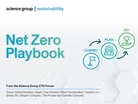P&G, PepsiCo, Mars, Bayer partner on net zero playbook

More than 5,200 businesses worldwide have signed up to the UN Race to Zero pledge to cut their greenhouse gas emissions to zero by 2050 or reach ‘net zero’ by cancelling out emissions. And many have set ambitious targets to achieve net zero even sooner.
And while some are on track, a new report by the NewClimate Institute shows that the companies surveyed would only cut their emissions by about 23% on average by 2030, falling far short of the figure of nearly halving in the next decade that scientists say is needed to limit global heating to 1.5C.
Many organisations are finding the race to net zero more challenging and complex than originally thought.
To help address these challenges in a technical and scientific way, and ultimately help businesses realise their net zero ambitions, Science Group Sustainability has convened R&D and science and technology leaders from seven global companies to come up with collaborative solutions.
The seven companies include Procter & Gamble, PepsiCo and Mars, packaging specialist Amcor, Bayer's crop science division, and chemicals firms Stepan Company and Solvay SA.
"Reducing greenhouse gas emissions is complex and brings immense technical challenges," Michael Zeitlyn, President Advisory Services at Science Group Sustainability, explains. "Innovation has a vital role to play, but it can't go far enough in isolation. We need to see strategic alignment across multiple business functions, from R&D and product stewardship to procurement and compliance departments.”
Identifying principles to help companies reach net zero
The initiative argues the case for leveraging R&D leadership and brings technical and science-led footing to the realisation of net zero ambitions, with leaders collaborating over the development of key principles to enable material progress on carbon reduction.
The companies and leaders involved share the belief that the complexity of net zero and other sustainability issues requires joined-up thinking between sectors, disciplines, and companies, and that whilst net zero goals and pledges may stretch beyond their personal tenure, they must own the problem.
“We need to reach significant milestones in the short-term and not trust that technological advances will 'find a way' in the long-term”, one member leader said.
The group met regularly over a 12-month period as part of a Science Group Sustainability CTO Forum. They analysed challenges hindering carbon reduction and considered ways to resolve them.
Together, they identified 10 principles that will help companies as they journey towards net zero. These range from articulating carbon and other sustainability themes as distinct but related issues, to ensuring carbon impact is part of any conversation about innovation.
"We can't treat carbon reduction as an afterthought, it must be woven into the fabric of our innovation practices from origination through to execution. We must use it as a lever to think differently so that we find opportunity to create irresistible experiences for our consumers whilst also reducing carbon,” another member of the forum said.
Net zero playbook – strategies to net zero success
Science Group Sustainability has developed a Net Zero Playbook and published an abridged version outlining the strategies trialled by the seven participants.
Designed as a tool for R&D leadership in tackling the challenge of carbon reduction, it demonstrates how the R&D function can evoke new ways of thinking and working that prioritise reduction of carbon emissions and includes a maturity model detailing and describing the ten principles that companies can embrace as they commit to, plan, and act on goals.
Zeitlyn says that while the specifics vary between companies and industry sectors, there are many common challenges and much can be learned from each other, not least the need for a joined-up effort both within the organisation and across the supply chain.
“We are all on a journey to net zero, and it's going to be tough, but we can achieve more when we work together.”



